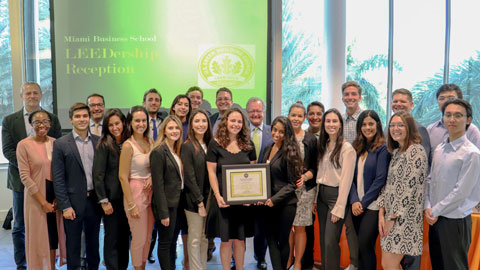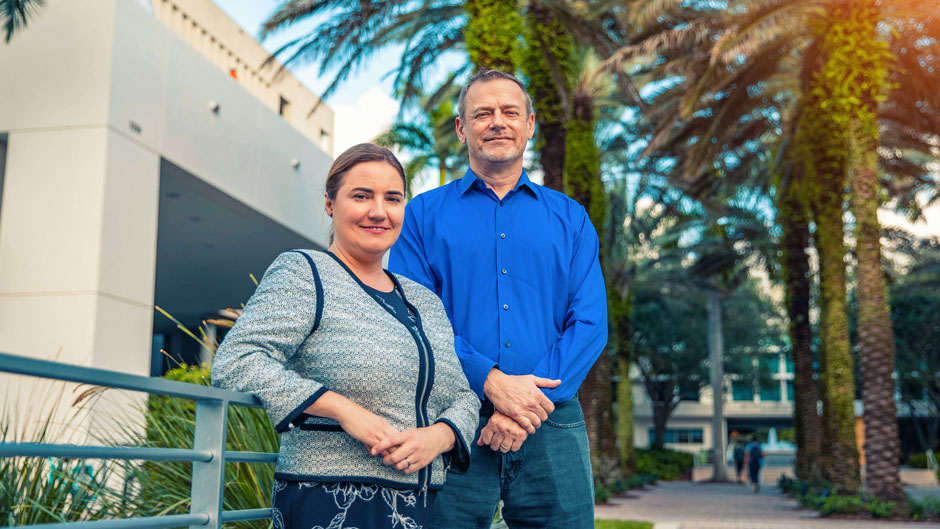When it comes to sustainability, do you have to be famous to make a difference?
Is Kim Kardashian a leader or an influencer?
Are leaders born or created?
These were some of the questions posed by Marie T. Dasborough, associate professor of management in the University of Miami Business School, to 24 students in her Leadership class, part of the newly launched Master of Science in Sustainable Business.
The 10-month program has enrolled students from 10 countries in its first cohort, seeking to become major players in companies that are supporting and integrating sustainable practices in their businesses.
“The students come from a wide range of cultural and functional backgrounds, and have various sustainability interests,” said Dasborough. “There is one thing that they all have in common – they all share a strong passion for making a positive lasting impact on the world.”
Besides leadership, the students are currently taking classes in sustainable accounting and a microeconomics course. In October, they will participate in a capstone project to develop sustainability projects with teams of employees at Office Depot in Boca Raton.
David Kelly, a professor in economics and the academic director of the Master of Science in Sustainable Business degree program, said UM established the program to fulfill an emerging need.
In past years, getting regulations for sustainable practices through Congress has been increasingly difficult. Instead, many in the private sector have picked up the slack, he said.
“Companies are saying, ‘We are going to do some environmental and social good and will get benefits from that – lower costs and better relations with our customers, perhaps product differentiation – and we will not rely on waiting for the government to come up with regulations’,” he said.
In 2011, only about 20 percent of S&P 500 companies were reporting on their sustainability efforts. By 2019, 85 percent of companies are filing such reports. These include not only a company’s carbon emissions output and environmental impacts, but social impact as well, said Kelly.
“They include things like how many low-income people are you helping out of poverty, how are you affecting the community,” said Kelly.
This kind of accountability from the private sector is attractive to many young people, especially millennials.
“Sustainability is a hot topic because it affects every living organism on the planet,” said Dasborough. “Every day we see news stories about potential threats to our wellbeing and to our survival: hurricanes, wildfires, drought, discrimination, harassment, poverty, pollution, and the list goes on. The time to act on these threats is now, and I believe that our students are highly aware of this need for sustainable changes to be made.”

Many of the students in the class want to make a difference wherever their future takes them. Some of the students arrived for the master’s program after having negative experiences in the private or government sector.
Mark Jackson came to the master’s program after he left his job as resources specialist for the Army Corps of Engineers in the Atlanta area.
“What made me leave government is that I exhausted every effort that I knew to find a way to develop sustainable practices within the government,” said Jackson.
Most projects he proposed, including introducing energy efficient lighting and solar energy in the agency’s facilities, were either stalled or rejected all together.
He came to UM because he liked the program and hopes to get a job in a sustainably conscious company or start his own company after earning his degree.
For Marcia Guevara, a Venezuelan student, there is an undeniable benefit in doing the program. Since the Master of Science in Sustainable Business is the only STEM certified one in the country, it allows foreign students to stay in the U.S. for three years after graduating to gain professional experience.
“This is the master’s of my dreams,” said Guevara. “I am passionate about sustainability and climate change.”
Guevara, who studied communication at the University of Oklahoma, decided to focus her studies on sustainability after doing an internship at Adobe in San Francisco. The company’s multiple benefits to employees, accessibility to leaders and mentors, community outreach, and sensitivity to environmental issues appealed to her.
“This is my passion and there is so much more that I can learn,” she said. “This program is exactly what I wanted.”
Guevara plans to pursue a career in sustainability consultancy, a field that is growing.
John A. Quelch, dean of the Miami Business School, said the School is at the forefront of this emerging field and attracting students who will make a difference in the world.
“Our students are dedicated to the importance of sustainability, and they will be the leaders of tomorrow entrusted with building successful businesses that respect the environment and are socially responsible,” Quelch said. “They will be shouldering critical responsibilities."

